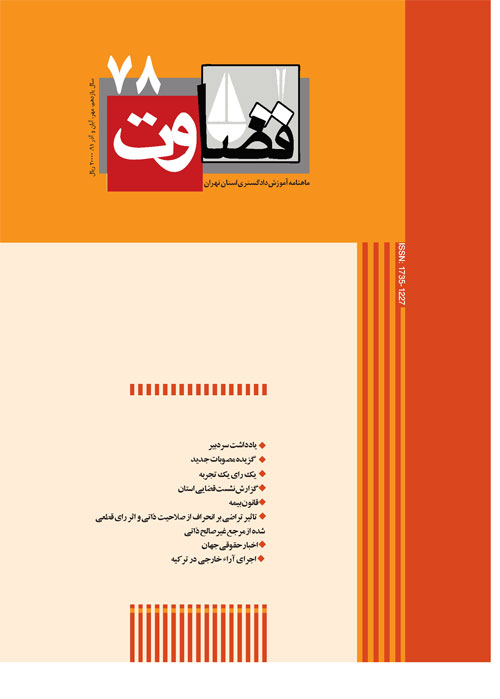فهرست مطالب

نشریه قضاوت
پیاپی 78 (پاییز 1391)
- تاریخ انتشار: 1391/09/13
- تعداد عناوین: 8
- یادداشت سردبیر
- گزیده مصوبات جدید
-
صفحات 7-13
- یک رای، یک تجریه
-
صفحات 14-15
- میزگرد
-
صفحات 16-42
- میهمان ماه
-
صفحات 43-47
- مقالات
-
صفحات 48-53
از ویژگی های صلاحیت ذاتی آمره بودن آن می باشد. در واقع قواعد مربوط به صلاحیت ذاتی جهت بوجود آوردن هماهنگی و نظم عمومی در بین سیستم های حل و فصل دعاوی می باشد هرچند در قانون آیین دادرسی مدنی مصوب 1379 هیچ تعریفی از این صلاحیت (صلاحیت ذاتی) بیان نشده است و هر کجا که صحبت از صلاحیت شده بیانی از صلاحیت ذاتی وجود ندارد و تنها در بند 1 ماده 371 ق.آ.د.م که اینگونه آمده: « دادگاه صادر کننده رای صلاحیت ذاتی برای رسیدگی موضوع را نداشته باشد...» به طور مجزا لفظ صلاحیت ذاتی را آن هم به صورت کلی بیان نموده است، لیکن با پرداختن به تعاریف حقوقی ازصلاحیت ذاتی و بیان انواع آن می توان از این ابهام خارج شد. در این مقاله سعی بر آن شده تا با بررسی صلاحیت ذاتی، اثر توافق و تراضی طرفین دعوا بر هریک از تقسیمات صلاحیت ذاتی (صنف، نوع و درجه) را با توجه به آمره بودن صلاحیت ذاتی از نظر صاحب نظران و دکترین بزرگ حقوق مورد بحث قراردهیم و نقش اراده را در انحراف صلاحیت ذاتی بیان نماییم. همچنین عدم توجه محاکم به عدم صلاحیت ذاتی و صدور حکم علی رغم نداشتن صلاحیت و قطعی شدن آن را بدون توجه مراجع بالاتر و یا قطعی شدن آن قبل از دارا شدن صلاحیت مراجع بالاتر به رسیدگی به عدم صلاحیت مرجع پایین تر مورد بررسی قرار گرفته و تکلیف رای قطعی شده از مرجع غیرصالح را به بحث می پردازیم.
کلیدواژگان: دلیل، دادرسی کیفری، اثبات دعوا، تحصیل دلیل، اسناد بین المللی حقوق بشری -
صفحات 54-55
- خارجی
-
صفحه 56
-
Pages 7-13
-
Pages 14-15
-
Pages 16-42
-
Pages 43-47
The problem of protecting the people injured by engine-driven means of transportation has been taken into consideration from 19th century and public rules and principles for protecting the people injured by enginedriven means of transportation in different countries is not recognized as sufficient; because most of the legal systems are based on fault and it is a difficult job to prove that fault. This is the reason why the civil liability rights changed in different countries for the same subject. Sometimes the legislator has issued special laws. Sometimes jurisprudence has caused changes. By considering article 1384 of France civil Law and an impetuous interpretation of that article, the mentioned article is provided for the damage caused by objects under humans protection in which the liability is recognized without the fault and its clear xample of the enginedriven means of transportation. The first issued law in our law is the compulsory insurance law for the liability of the owners of engine-driven means of transportation against third person issued in 1968 which accepts the compulsory insurance and points to the civil liability of the owner, especially in one article it points out that the owner is bound to compensate the damage caused by the means of transportation and must insure his liability. The compulsory insurance exists in most of the countries and by this mean the personal liability changes into public liability and the collective source of damage compensation is formed. This law is enforced in courts and has caused the establishment of methods, problems, and ambiguities. Since this law has some ambiguities and did not sufficiently protect the injured people, the amendment of the compulsory Insurance Law for the liability of owners of enginedriven means of transportation against third person was issued in 2008. The title of this law is the Amendment of Insurance Law but in fact it abolishes the previous one; then it has no clear title because it is not an amendment but a new law and the expression of civil liability of owners also must be discussed that whether the civil liability in its particular concept means all damages or another liability with a more limited area which will be discussed.
-
Pages 48-53
One of the features of the natural competence is its imperativeness. In fact, the principles related to the natural competence is for establishing a public harmony and order between the systems of hearing the cases although in Civil Procedure Law issued in 2000 there is no definition of this competence (natural competence) and wherever the competence is mentioned, there is no statement about the natural competence and only in sub-article 1 of article 371 of the Civil Procedure Law in which it is stated that: if the court which issues the verdict does not have the natural competence of hearing separately the expression of natural competence has been said in general but by getting through the legal definitions of natural competence and stating different types of it, the ambiguity can get clear. In this article it is tried to discuss the effect of mutual consent and agreement of both parties on any types of the natural competence regarding its imperativeness considering the natural competence and state the role of will in the deviation of natural competence.
-
Pages 54-55

